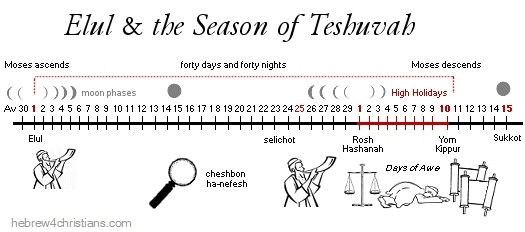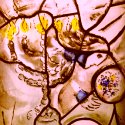|
The Mishnah says, shuv yom echad lifnei mitatakh: "Repent one day before you die" (Avot 2:10), but who knows the day of one's death in advance? Perhaps your name will be called today, ending your lease on life in this world. Are you ready? Are you prepared to appear before God your Creator and Redeemer? The apostle Paul likewise urges us to undergo self-examination: "Put yourselves to the test (ß╝æ╬▒ŽģŽä╬┐ßĮ║Žé ŽĆ╬Ą╬╣ŽüßĮ▒╬Č╬ĄŽä╬Ą) to see if you are in the faith; prove yourselves (ß╝æ╬▒ŽģŽä╬┐ßĮ║Žé ╬┤╬┐╬║╬╣╬╝ßĮ▒╬Č╬ĄŽä╬Ą) to see whether Yeshua the Messiah lives within you - lest you fail the test and be disapproved (ß╝Ć╬┤ßĮ╣╬║╬╣╬╝╬┐Žé)" (1 Cor. 13:5).
Whether Yeshua is living in you (and you are living in Him) is the most important question of your life upon which everything else turns. The great mystery is "Messiah in you, the hope of glory" (Col. 1:27). As Ravenhill once said, "I don't ask people if they're saved anymore; I look them straight in the eye and say, "Does Christ live inside you?" Are you connected with Him in the truth? Are you drawing life from His life? Do you really live in Yeshua?
The Apostle Paul said we were to both "test ourselves" with regard to the intellectual content of our faith and also to "prove ourselves" with regard to the veracity of our spiritual life: "Put yourselves to the test (ß╝æ╬▒ŽģŽä╬┐ßĮ║Žé ŽĆ╬Ą╬╣ŽüßĮ▒╬Č╬ĄŽä╬Ą) to see if you are in the faith; prove yourselves (ß╝æ╬▒ŽģŽä╬┐ßĮ║Žé ╬┤╬┐╬║╬╣╬╝ßĮ▒╬Č╬ĄŽä╬Ą) to see whether Yeshua the Messiah lives within you - lest you fail the test and be disapproved (ß╝Ć╬┤ßĮ╣╬║╬╣╬╝╬┐Žé)" (1 Cor. 13:5). Notice that the verb "to prove" (i.e., dokimadzo: ╬┤╬┐╬║╬╣╬╝ßĮ▒╬ČŽē) means to test something by fire (like a precious metal) to discover its quality and purity. The analogy here is straightforward. The quality of our faith will be revealed during times of testing and hard circumstance. Do we walk in love, joy, and peace - despite the testing of this life? If our faith regularly fails in the crucible of testing, we may need to reexamine its authenticity (Prov. 24:10).
ūŚųĖū¦ų░ū©ųĄūĀų┤ūÖ ūÉųĄū£ ūĢų░ūōųĘūó ū£ų░ūæųĖūæų┤ūÖ
ūæų╝ų░ūŚųĖūĀųĄūĀų┤ūÖ ūĢų░ūōųĘūó ū®ūéųĘū©ų░ūóųĘūżų╝ųĖūÖ
ūĢų╝ū©ų░ūÉųĄūö ūÉų┤ūØųŠūōų╝ųČū©ųČūÜų░ųŠūóū”ųČūæ ūæų╝ų┤ūÖ
ūĢų╝ūĀų░ūŚųĄūĀų┤ūÖ ūæų╝ų░ūōųČū©ųČūÜų░ ūóūĢų╣ū£ųĖūØ
chok┬Ęrei┬Ęnee ┬Ę el ┬Ę ve'da ┬Ę le┬Ęvah┬Ęvee
be┬Ęchah┬Ęnei┬Ęnee ┬Ę ve'da ┬Ę sar┬Ęa┬Ępai
oor┬Ęeih ┬Ę eem ┬Ę de'┬Ęrekh ┬Ę oh'┬Ętzev ┬Ę bee
oo'ne┬Ęchei'┬Ęnee ┬Ę be┬Ęde'┬Ęrekh ┬Ę oh┬Ęlahm

"Search me, O God, and know my heart!
Examine me and know my anxieties;
And see if there be any idolatrous way in me,
and lead me in the way everlasting"
(Psalm 139:23-24)

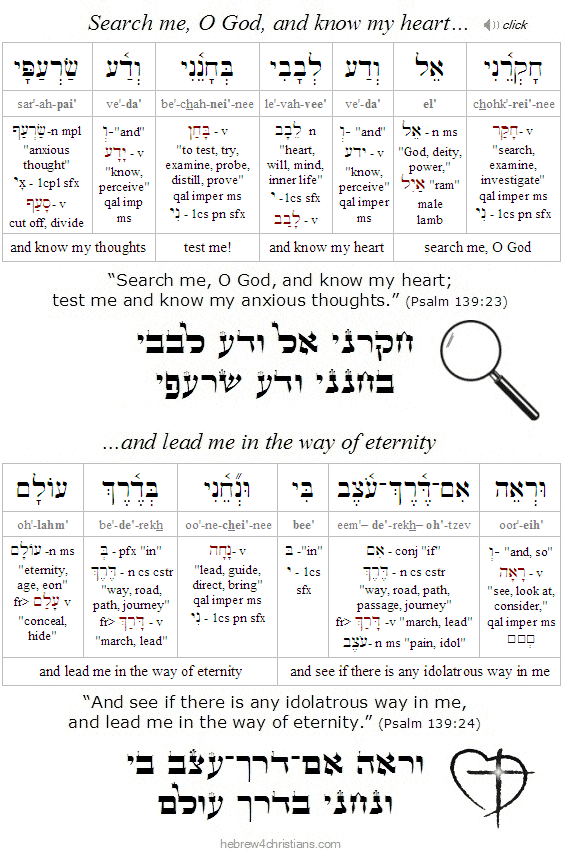 |
A proven faith is one that evidences the Fruit of the Holy Spirit, though other characteristics include an abhorrence for personal sin and the desire to obtain God's forgiveness; a hunger and thirst for God's righteousness to be manifest; a sincere willingness to obey the LORD and keep His commandments, and a heartfelt love for God and others. These characteristics mark genuine teshuvah ("repentance"), that is, a turning away from inner darkness to the light of the Divine Presence. Teshuvah is a miracle that transforms the person so that the inner man becomes a new creation (2 Cor. 5:17). Spiritual rebirth implies a new heart with a new set of affections: "I am crucified with Messiah. It is no longer I who live, but Messiah who lives in me. And the life I now live in the flesh I live by faith in the Son of God, who loved me and gave himself for me" (Gal. 2:20).
The Jewish view of truth is inherently existential - how you live reveals what you believe, and vice-versa. The truth must be lived in order to be real. We are to be "doers" of the Word, and not hearers only, since faith without works is dead and leads to self-deception (lit., "reasoning around" the truth, i.e., ŽĆ╬▒Žü╬▒╬╗╬┐╬│ßĮĘ╬Č╬┐╬╝╬▒╬╣, from ŽĆ╬▒ŽüßĮ▒, "around, beside" and ╬╗╬┐╬│ßĮĘ╬Č╬┐╬╝╬▒╬╣, "to reason"). Only those who follow through and live out their faith will be blessed in their actions (James 1:22, 25). This mirrors Yeshua's statement, "If you know these things, blessed are you if you do them" (John 13:17).
Reb Lev said, 'A tzaddik is one who lives Torah, not one who preaches it. Your actions, not your words! You have to be Torah: your habits, your motions, even your silences - are what count..."
There remains the frightening possibility that the soul - even the soul that professes faith in the Messiah - may fail the test of genuine faith and be rejected (i.e., adokimos: ß╝Ć╬┤ßĮ╣╬║╬╣╬╝╬┐Žé, "tested and found useless"). A person who merely professes love for God with his lips but whose heart is far from Him will eventually hear the verdict of truth, which ratifies the inner life of the soul: "Depart from Me, I never knew you..." This is the like-for-like principle of faith, the reciprocity of the inner life of the soul. Our faith in Messiah must be unalloyed - pure, without compromise in its composition and character. May God help each of us...
Should we live in fear of ourselves? After all, "the heart is deceptive above all things and desperately wicked" (Jer. 17:9), and it is woefully easy to fool ourselves regarding our sins (1 Cor. 8:2; Gal. 6:3; James 1:26). Well on the one hand we should indeed be afraid of our own sinful tendencies and abhor the sin in our lives, but on the other we must practice hope in God and trust in his healing and deliverance. Moreover, we can experience freedom from dread by receiving the joy that comes from the assurance that we are accepted in the Beloved. God has not given us a spirit of slavery to fall back into fear; and there is no fear in His love (Rom. 8:15; 2 Tim. 1:7; 1 John 4:18). Of course we all will fail the test apart from the grace and love of God, and no one can be approved by means of the unaided will. We all need a miracle from God to love Him in the truth and to pass the test -- but God is the One who performs miracles for us. The LORD is Adonai Nissi (ūÖūöūĢūö ūĀų┤ūĪų╝ų┤ūÖ), the God of my miracle...
There is a price to be paid for the miracle of God being manifest in our lives. The message of the cross means confessing the truth about who we are and how we have failed the test of faith. Yeshua does not appeal to the self-righteous ones to come for healing, but rather to the sin-sick and weary (Mark 2:17). The LORD wants us to be honest with ourselves:
ūöųĄū¤ųŠūÉų▒ū×ųČū¬ ūŚųĖūżųĘū”ų░ū¬ų╝ųĖ ūæųĘūśų╝ų╗ūŚūĢų╣ū¬
ūĢų╝ūæų░ūĪųĖū¬ų╗ūØ ūŚųĖūøų░ū×ųĖūö ū¬ūĢų╣ūōų┤ūÖūóųĄūĀų┤ūÖ
hein-e┬Ęmet ┬Ę chah┬Ęfatz'┬Ętah ┬Ę va┬Ętoo┬Ęchoht
oov┬Ęsah┬Ętoom ┬Ę chokh┬Ęmah ┬Ę toh┬Ędee┬Ęei'┬Ęnee

"Behold, You delight in truth in the inward being,
and you teach me wisdom in the secret heart."
(Psalm 51:6)
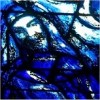
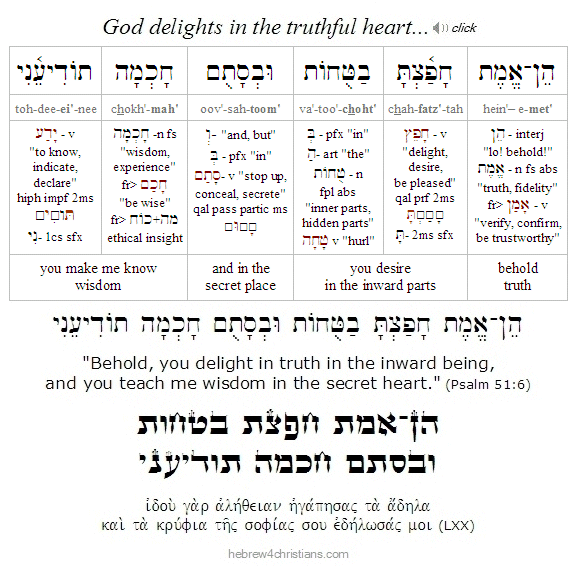
The unexamined life -- especially as a follower of Yeshua -- is not worth living, and the practice of suppressing the truth about our sinful condition can lead to self-deception and even death (1 Cor. 11:30). "If we say we have no sin, we deceive ourselves, and the truth is not in us; if we confess our sins, he is faithful and just to forgive us our sins and to cleanse us from all unrighteousness" (1 John 1:7-8). "Therefore, confess (ß╝É╬Š╬┐╬╝╬┐╬╗╬┐╬│ßĮ│Žē, lit. 'confess out') your sins to one another and pray (╬ĄßĮöŽć╬┐╬╝╬▒╬╣) for one another, that you may be healed. The prayer of a righteous person (tzaddik) works great power" (James 5:16).
Notice the link between confessing our sins and praying for one another with healing... Being yashar - honest and upright - produces spiritual power and life. The word translated "pray" (euchomai) means to "wish (╬ĄßĮÉŽćßĮ┤) for oneself (or for another) the good." Prayer is always reciprocal, as King David said in Psalm 35:13: "may what I prayed for happen to me!" (literally, tefillati al-cheki tashuv - "may it return upon my own breast").
We are all on a spiritual journey, writing the "Book of our Life." To help us in the "writing" process, we must engage in cheshbon hanefesh (ūŚųČū®ūüų░ūæų╝ūĢų╣ū¤ ūöųĘūĀų╝ųČūżųČū®ūü) - "making an account of the soul." This means that we engage in honest self-examination about our behavior. We take time to review our lives and ask some hard questions: "How did I get to this place in my life?" "Where am I now?" "Am I where I should be?" We engage in this process of self-examination with an aim let go of the pain of the past and move forward. We find our deliverance by looking to Yeshua:
If you repent of sin without looking to Christ, away with your repentance! If you are so lamenting your sin as to forget the Savior, you have need to begin all this work over again. By no means look at your sin except as you look at Jesus. A man may hate sin just as a murderer hates the gallows ŌĆō but this does not prove repentance. If I hate sin because of the punishment, I have not repented of sin ŌĆō I merely regret that God is just. But if I can see sin as an offense against Jesus Christ and loathe myself because I have wounded Him, then I have a true brokenness of heart. Only under the Cross can you repent. Repentance elsewhere is remorse which clings to the sin and only dreads the punishment. Let us then seek, under God, to have a hatred of sin caused by a sight of Christ's love. - C.H. Spurgeon
(Another way to say this is that teshuvah (ū¬ų╝ų░ū®ūüūĢų╝ūæųĖūö) really means turning back to embrace God's love... Our sin wounds the heart of God, and yet the breach caused by our sin can only be remedied by love's suffering on our behalf, taking up our loss... )
We must begin by asking God for courage and strength... We must let go of the fear that we will discover the truth about who we really are -- about what we've done, what we've thought, about who we've allowed ourselves to become. Confession (ßĮü╬╝╬┐╬╗╬┐╬│ßĮĘ╬▒) means bringing yourself naked before the Divine Light to agree with the truth about who you are. Indeed, the word homologeo literally means "saying the same thing" - from ßĮü╬╝ŽīŽé (same) and ╬╗ßĮ╣╬│╬┐Žé (word). We need to confess the truth if we are to be free from the pain of the past. When King David wrote, "The LORD is my Light and my salvation; whom shall I fear? (Psalm 27:1), he implied that he should even be free of fear of himself and of his past.... We also need to understand our sin in relationship to the wounds of the Savior, since without that connection, our repentance will be vain indeed....
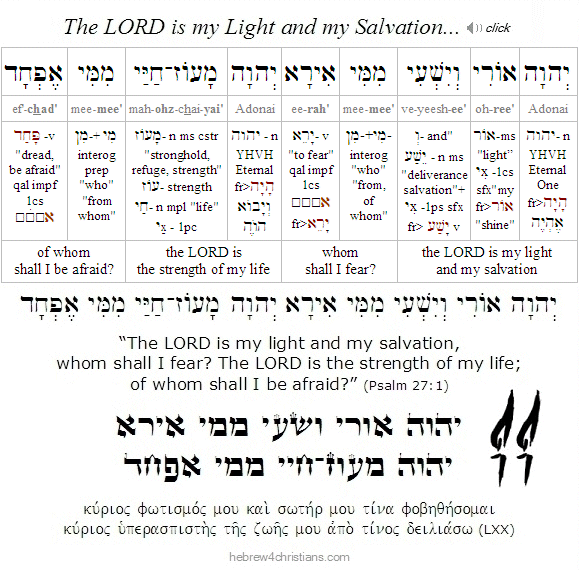 |
The road that stretches before our feet is a challenge to the heart long before it tests the strength of our legs. Our destiny is to run to the edge of the world and beyond, off into the darkness; assured - for all our blindness; secure - for all our weakness; joyfully in love - for all the pressure on our hearts... In that darkness beyond the world we can begin to know the world and ourselves, we begin to understand that we not made to pace out our lives behind prison walls, but to walk into the arms of God." (quote of Thomas Aquinas in Farrell and Healy: "My Way of Life," 1952.)
Of course it is a struggle to keep our focus along the way, and there are various tests we all will experience, including the tests of apathy, weariness, confusion, and so on... We must ask the LORD God of Israel to awaken us to His resurrected and all-glorious Presence. His radiance fills the heaven and the earth, and by faith we take hold of hope with wonder, praise, and great joy.... May it please God to help each of us "put on the new self, created after the likeness of God in true righteousness and holiness" (Eph. 4:24). Amen.
|

